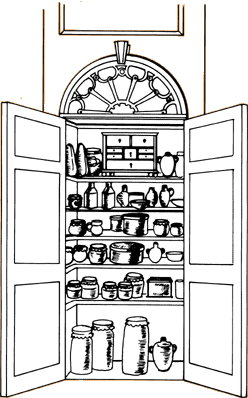
| The Plantation Community Lesson Nine MRS. MASON'S CLOSET |
|||
|
|
||
READ AND DISCUSS Can you imagine storing food in your bedroom? That's what Mrs. Ann Mason did. Her chamber on the first floor of Gunston Hall had a storage closet. Here, she kept special food items imported from Great Britain and the West Indies, such as sugar, tea, coffee, chocolate, and spices. She also stored herbs from the kitchen garden. Why do you think Mrs. Mason kept these things close at hand? Most of the food items stored in her closet were expensive or limited in supply. These items would be safe in the closet, which was locked. Of course, a closet is only so big. Some foodstuffs which were used in large amounts (such as flour, eggs, and butter) were kept in other places. Wine and ale were also stored elsewhere. Each morning, Mrs. Mason met with the cook to talk about the day's menu for her family. At this time, she unlocked the closet and doled out to the cook the exact amount of foodstuffs needed. It was important for Mrs. Mason to plan ahead. The herbs had to last through the winter. And she didn't want to run out of sugar before the next ship was due in from the West Indies! |
|||
ACTIVITY 1. Read the two recipes, called receipts. These are for typical dishes of the 1700s. List the ingredients by number in the categories below. These ingredients were grown or found on the plantation: These ingredients were imported from other places: 2. Look in Mrs. Mason's closet. Which ingredients from Hare Soup and Sweet-Potato Pudding were probably stored there? List by number: |
 |
||
| Receipts are taken from The Virginia House-wife by Mrs. Mary Randolph. Although the book was not published until 1824, it features recipes from the earlier colonial period. | |||
[Home Page] [Seasonal Events] [Library & Archives] [Educational Resources]
[George Mason] [Group Tours] [Museum Shop] [Directions] [Guest Book] [Links]
Gunston Hall Plantation
Mason Neck, Virginia 22079
703.550.9220
703.550.9480 fax
Email: Historic@GunstonHall.org
Public Hours: 9:30 a.m. - 5:00 p.m.
Open every day except Thanksgiving, Christmas and New Year's Day
©2000-2001 Gunston Hall Plantation